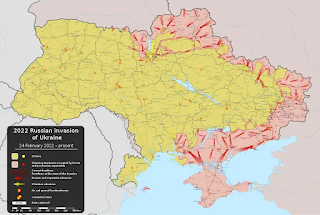 |
| Present Ukrainian situation map, via Wiki |
Seven years ago I wrote about the similarities between Russia's invasion of Crimea and Donbas and Japan's 1931 invasion of Manchuria. It is remarkable that Putin is now invading Ukraine in a way that has so many similarities to Japan's ill-fated full-scale invasion of China in 1937 that followed their aggression in north-east China.
The motives of both are similar. Japan's invasion of China ultimately sprang from the fact that they could never be secure in their possession of those parts of China that they had already invaded and annexed whilst some part of China remained outside their control. Similarly Russia's hold on Donbas and Crimea is not secure whilst Ukraine has a central government that refuses to accept Russian occupation of these territories.
The goals are similar, in that they are largely about regime change. China wished to install a Chinese government in place of Chiang Kai-Shek's KMT that would do their bidding. Putin says he wishes to "denazify" Ukraine, a statement that, if it has any meaning at all (and it may not) points to a change in government in Kiev, perhaps installing a government under the disgraced and treacherous Yanukovich. In both cases these aims are deeply unrealistic and based on false assumptions, since the Chinese people would never have accepted a Japanese puppet government nor will the Ukrainians accept being a satrapy of Moscow.
Both invasions scored initial successes - the Japanese invasion of China much more obviously so than the Russian invasion of Ukraine - before petering out as the invaders became over-extended. In both cases the invaders face the same military paradox: advancing further means occupying more territory that they do not have the strength to occupy and so worsening the situation, yet victory cannot be achieved without a further advance.
As with the Japanese in 1937-41, Putin's regime even refuses to acknowledge that it is actually at war. The Japanese described their aggression in China as a mere "incident", whilst the Russian government insists that their aggression in Ukraine is only a "special military operation". In both cases this failure to acknowledge the reality of what they are doing created problems - if Russia is not at war then measures such as calling up the reserve or creating a new draft cannot be justified, and Russia's soldiers are sent into combat with the notional expectation that they are not going to be shot at and killed. Similarly Japan never fully mobilised for war in China until their war became global in 1941.
Russia in 2022 and Japan in 1937 are also similar in an economic aspect. Japan could only continue their war in China with oil and scarp-metal imports from the US and European powers. Russia relies on revenue from hydrocarbon exports of gas and oil to Europe to keep its economy afloat. In the case of Japan these were belatedly cut off, in the case of Russia we are still in the process of weaning ourselves off our addiction to Russian oil and gas.
Of course one can take historical parallels too far. Japan's leaders, frustrated by their failure in China, expanded their war further and further, until it erupted out across the entire Indo-Pacific area, hoping that an elusive military victory would dig them out of the hole they were in. We can hope that the Russians will have more sense than this, and the lack of military success in Ukraine should deter them from trying their luck with more powerful and well-prepared opponents such as Finland, Sweden, and NATO.
I also fervently hope that the present war in Ukraine does not end in the same way that Japan's war on China did - with a world war and the use of nuclear weapons.


